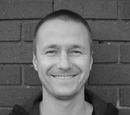Contact
School of Social and Political Sciences (SSPS)
Social Anthropology
Chrystal Macmillan Building
15a George Square
Edinburgh EH8 9LD
United Kingdom
Email:
hacklandreas@yahoo.com
Further Information
Dissertation Project
Palestinians in Tel Aviv
This research explores the everyday engagement of Palestinians and Palestinian citizens of Israel with the urban space of Tel Aviv, a site often imagined as an explicitly Jewish city. Such inclusion into an essentially Jewish-Israeli space demands a difficult balancing act from the individual Palestinian. On the one hand, the experience of discrimination, prejudice and systematic exclusion limit the possibilities of social and cultural immersion. And this limitation is increased by the Palestinian community’s own cultural and political boundaries. On the other hand, individual Palestinians move to Tel Aviv in large numbers in search for work or educational opportunities. To some extent, individual Palestinian citizens of Israel may well enjoy the benefits of urban life in Tel Aviv more generally as they blend in despite the many difficulties that accompany such inclusion.
Everyday life in the midst of Jewish-Israeli Tel Aviv is then characterized by a confluence of cooperation and conflict. It involves an uneasy coexistence with and within a highly differentiated space that is dominated socially, culturally, economically and politically by Jewish Israelis and the national project of Israel more generally. For Palestinians in Tel Aviv, everyday life frequently turns into multiple struggles with power. It involves a routine of crossing and appropriating boundaries between multiple senses of self and other. The recurring experience of tension and friction is built into this dynamic everyday experience. This is specifically true for the Palestinian citizens of Israel, who are the focus of this research.
Following the Arab-Israeli War of 1948 the State of Israel was created and with it the displacement of some 750.000 Palestinians who subsequently became refugees without the option to return. The majority of those who remained on their land became confined within what is today the occupied Palestinian territory (i.e. West Bank, Gaza Strip, and East Jerusalem). And yet some 160.000 Palestinians suddenly found themselves within the borders of the newly formed ‘Jewish State’. They became “minority” citizens in a state that forcibly migrated to them.
For today’s Palestinian citizens of Israel identities are at once partial and plural. Partial because being Palestinian and Israeli is often considered to be mutually exclusive. Plural because Palestinian citizens of Israel nonetheless incorporate multiple senses of belonging and differing within their individual identities, often in contrast to the essentialisms that frame discourse around collective senses of belonging and differing. The tension between partiality and plurality – between inevitable difference on the one hand and the individual capacity to go beyond it on the other – is characteristic for the Palestinian experience of an essentially Jewish-Israeli space such as Tel Aviv.
The case of Palestinian workers in Tel Aviv who commute from the occupied Palestinian territory into the area of Tel Aviv is certainly different and yet very similar. Unlike the Palestinian citizens of Israel, these commuters’ ability to engage with Tel Aviv is bound to Israel’s permit regime. These workers ‘ability to inclusion’ also depends on their willingness to move across a whole infrastructure of occupation on a daily basis; the very same political structure that nonetheless opens a temporary passage into Israel for this cheap labour supply force.
Drawing on ethnographic research among Palestinians in Tel Aviv, this research seeks to address the contemporary lives and mundane struggles of a marginalized population in the urban space of the national “other”. At the heart of the inquiry lies the often contradictory relationship between individual Palestinians and the wider fields of power, space and identity their everyday lives are embedded in. And in similar vein, the multiple ways in which they, as subjectivities and agents, cope and struggle with such contradictions.
Supervisors: Prof. Dr. Tobias Kelly and Dr. Jamie Furniss (in the PhD program: Prof. Dr. Dan Rabinowitz)


